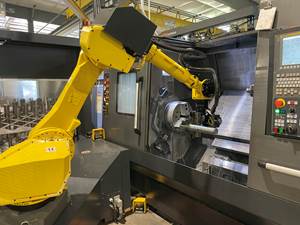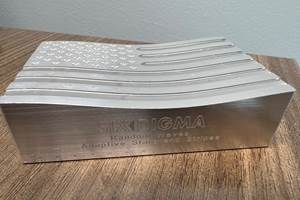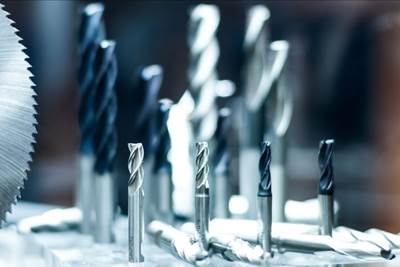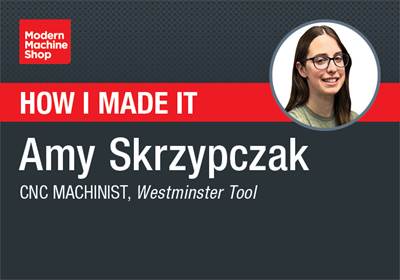How I Made It: Trevor Hirschi, Instructor, Bridgerland Technical College
Student, operator, instructor, shop owner — Trevor Hirschi’s many roles have enabled him to understand both the technical and creative sides of manufacturing.
Share



Autodesk, Inc.
Featured Content
View More

Takumi USA
Featured Content
View More.png;maxWidth=45)
DMG MORI - Cincinnati
Featured Content
View More

Trevor Hirschi not only works as an instructor at Bridgerland Technical College, but he also operates his own backyard job shop, Titan Ring Designs. Photo courtesy of Trevor Hirschi.
I started in machining in the class that I teach right now. In high school I always liked fine-detail stuff — working with my hands. A shop teacher recommended I come take the machine class that they offered here at Bridgerland. I took it and I could make parts for my four-wheeler, my motorcycle. I kind of got hooked when I had a part that was broken and I couldn't get a replacement part. I just made one and was like, “this is so cool because I can make anything.”
I like showing people what I like to do, what I'm passionate about. I don't have a degree in teaching or anything like that. I just went through this program. I went to university. I was going to go do mechanical engineering and electrical engineering and realized I already kind of do the mechanical engineering side on my own, and I like to make stuff as an engineer. I basically sat at the computer all the time, so it's like I would rather go make things all the time, so I aimed back into the machine shop. And when the teaching opportunity arose I was like, yeah, sure I would love to show kids how to make stuff.
I didn't do any 3D machining when I went through the program. I learned on Mastercam X and X2. A lot of the 3D toolpaths weren't really being utilized by shops at that time. It wasn't until around X3 when the dynamic toolpaths started to come into to play. High-speed machining stuff, I didn't learn any of that in school. I learned it out in the field. Now, the technology is so important. We had a grant a couple of years ago where we got two five-axis Haas mills. That's part of the curriculum that they can access and learn these. It's way more than what I got when I went through the program in high school. Some of these kids are so smart and they just pick it up like nothing. It's so fast. While it was a more gradual learning experience for me, some of these guys, they can pick it up so quickly.
There's something about that for this generation that, like when shop owners go, yeah, these guys are untrainable. I've seen some young high school kids that are plenty smart. But it's like trying to run a chariot instead of a dogsled. It's a different approach. You just have to see it a little bit differently. And you train them differently, right? I mean a lot of shops say “We need to get them off of their phones. Everybody wants to be on their phones,” and that's not wrong, but take advantage of that somehow.
Asking questions is so important. There's so much to learn in the manufacturing industry — I can still learn things every day and I try to.
My favorite thing in manufacturing is just being able to create. My mom is an artist; she likes to paint and draw. My sisters are the same way. They're really good at drawing and painting and ceramics and clay and sculpting and stuff like that. But I can spend hours on SolidWorks and forget to eat. I just like to create, and machining has become my paintbrush and canvas of choice. I love having something in my hand that didn't exist a day ago.
Related Content
Finding the Right Tools for a Turning Shop
Xcelicut is a startup shop that has grown thanks to the right machines, cutting tools, grants and other resources.
Read MoreSame Headcount, Double the Sales: Successful Job Shop Automation
Doubling sales requires more than just robots. Pro Products’ staff works in tandem with robots, performing inspection and other value-added activities.
Read MoreBuilding Machines and Apprenticeships In-House: 5-Axis Live
Universal machines were the main draw of Grob’s 5-Axis Live — though the company’s apprenticeship and support proved equally impressive.
Read MoreHow I Made It: Amy Skrzypczak, CNC Machinist, Westminster Tool
At just 28 years old, Amy Skrzypczak is already logging her ninth year as a CNC machinist. While during high school Skrzypczak may not have guessed that she’d soon be running an electrical discharge machining (EDM) department, after attending her local community college she found a home among the “misfits” at Westminster Tool. Today, she oversees the company’s wire EDM operations and feels grateful to have avoided more well-worn career paths.
Read MoreRead Next
Addressing the Manufacturing Labor Shortage Needs to Start Here
Student-run businesses focused on technical training for the trades are taking root across the U.S. Can we — should we — leverage their regional successes into a nationwide platform?
Read MoreHow I Made It: Amy Skrzypczak, CNC Machinist, Westminster Tool
At just 28 years old, Amy Skrzypczak is already logging her ninth year as a CNC machinist. While during high school Skrzypczak may not have guessed that she’d soon be running an electrical discharge machining (EDM) department, after attending her local community college she found a home among the “misfits” at Westminster Tool. Today, she oversees the company’s wire EDM operations and feels grateful to have avoided more well-worn career paths.
Read MoreThe Power of Practical Demonstrations and Projects
Practical work has served Bridgerland Technical College both in preparing its current students for manufacturing jobs and in appealing to new generations of potential machinists.
Read More














































